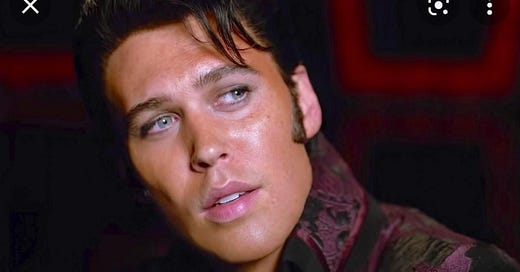“Elvis” (2022) isn’t the first time the singer has been portrayed in a movie. Nor will it be the first time you see someone dressed up in a ridiculous white jump suit and oversized sunglasses.
But it might be the first time you see the best-selling solo artist in musical history portrayed with such dimensionality, honesty, and energy. And we should give a rousing thank-you to writer-director Baz Luhrmannn.
Luhrmann illustrates the early chapters of EP’s life with quick cuts of Elvis’ impoverished childhood in small-town Mississippi, where he sneaks off to Black revivalist church meetings. The young Elvis is caught up in the frenzy of swaying, wriggling, chanting parishioners—moves he would employ throughout his professional career.
One day, Elvis (Austin Butler) performs at a local carnival in Mississippi, where he is spotted by a P.T. Barnum-type promoter named Colonel Tom Parker (Tom Hanks). Observing the crowd’s wild, emotional reaction, he realizes he may be witnessing a true phenom. Parker approaches Elvis with the idea of making him the most famous entertainer in the world. Elvis bites, and a star is born.
The next few years of Elvis life are a whirlwind. His musical career continues to draw raves as well as controversy—wows from younger, mostly female audiences, and criticism from bigoted Senator James Eastland (Nicholas Bell) and others (including Frank Sinatra!) for his pelvis-shaking and his “race music.” Parker senses the potential damage to Elvis’ reputation, and convinces the singer to join the Army and exemplify true-blue American patriotism.
The strategy works, and Parker, you should pardon the expression, is on a roll. Once EP is discharged from the service, the Colonel shuffles him off to Hollywood, where he stars in a series of forgettable films (full disclosure: I suffered through all of them as a kid.) Elvis then moves on to Las Vegas, where careers usually go to die. The exception proves the rule, however, and EP flourishes in Vegas, until he suffers a fatal heart attack at the age of 42.
The real strength of “Elvis” lies in Luhrmann’s recreation of the singer’s on-stage performances. Butler is eons away from just impersonating Elvis; the actor digs deep—capturing the singer’s vocal style and his wiggling hips (as well as his soft-heartedness). You begin to understand what people saw—and still see—in him. Hanks arguably gives one of the meatiest performances of his career as Colonel Tom Parker: paunchy and sleazy, he is Mephistopheles with a Dutch accent, a stogie stuck in his mouth and dollar signs flashing in his eyes.
The rest of the cast is just as wonderful. Blues musician Gary Clark Jr shines as Arthur “Big Boy” Crudup, as does Kelvin Harrison Jr as B. B. King. Shonka Dukureh is just about perfect as Big Mama Thornton, whose “Hound Dog” was covered (some would say stolen) by Elvis, as is Yola as Sister Rosetta Thorpe.
Conventional wisdom has it that “Citizen Kane” worked because the studios let Orson Welles run the whole show. You sense the same hands-off approach with “Elvis.” As a result, Baz seems to have gotten the singer’s life exactly right, which his widow Priscilla has confirmed in recent television interviews.
Whether you are a life-long fan of Elvis Presley the singer or not (I candidly fall into the second category), you cannot help falling in love with Elvis Presley the movie. In theaters and streaming on HBO Max.




Great review, as always, mon ami.
About halfway through the movie now. Although I was never a big Elvis fan, it’s not just another tired retread of his life. Tom Hanks is unrecognizable as the Colonel.